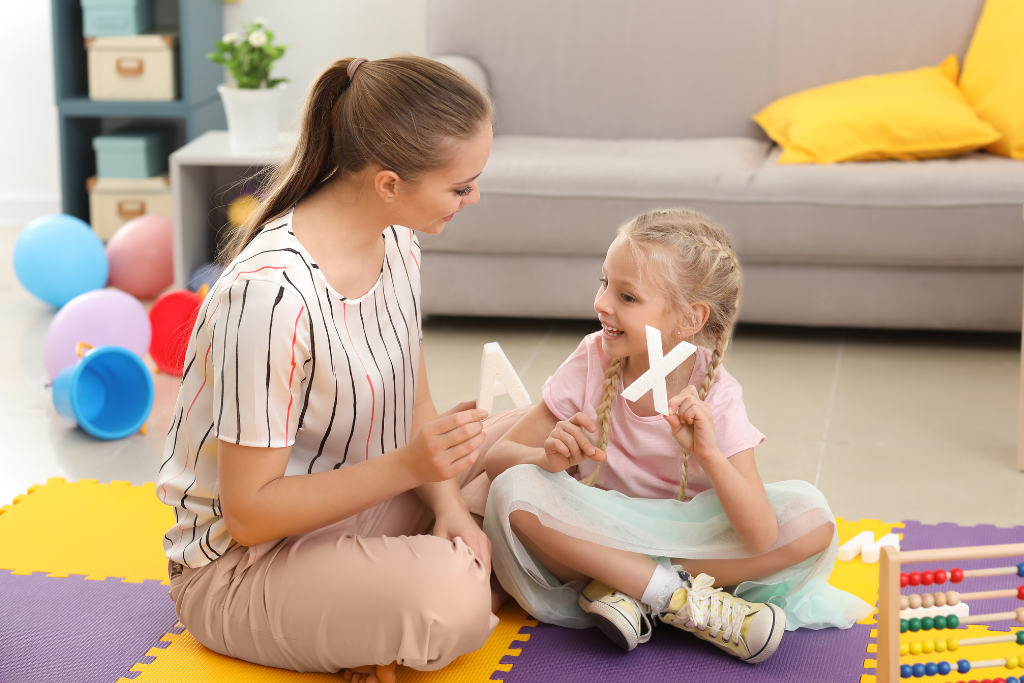Children and teens with dyslexia experience difficulties processing a language's basic sounds. Dyslexia is also called auditory dyslexia because of how dyslexia impacts how the brain processes phonemes. With dyslexia, the human brain can't accurately or efficiently process sounds or language.
Auditory dyslexia makes it hard for kids to distinguish the minor sound differences between words. They also need to remember what they hear and have a hard time processing speech when multiple people are talking or if there's background noise.
Auditory Processing Disorder or APD, which refers to the abnormality in sound processing of the central auditory nervous system, isn't the same as auditory dyslexia even though both affect how one processes sounds. APD is a disorder where one struggles to process what they hear when there is a competing sound.
Children with APD can't seem to understand the conversation, even if it looks like they are paying attention. As a result, these kids always ask the speaker to repeat what they just said several times. Kids with APD have difficulty processing spoken language.
Facts about Auditory Dyslexia
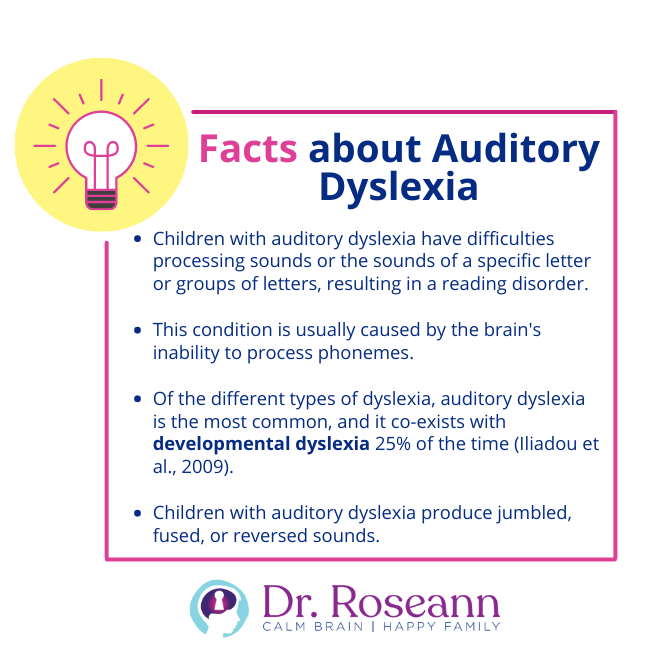
- Children with auditory dyslexia have difficulties processing sounds or the sounds of a specific letter or groups of letters, resulting in a reading disorder.
- This condition is usually caused by the brain's inability to process phonemes.
- Of the different types of dyslexia, auditory dyslexia is the most common, and it co-exists with developmental dyslexia 25% of the time (Iliadou et al., 2009).
- Children with auditory dyslexia produce jumbled, fused, or reversed sounds.
Signs of Auditory Dyslexia
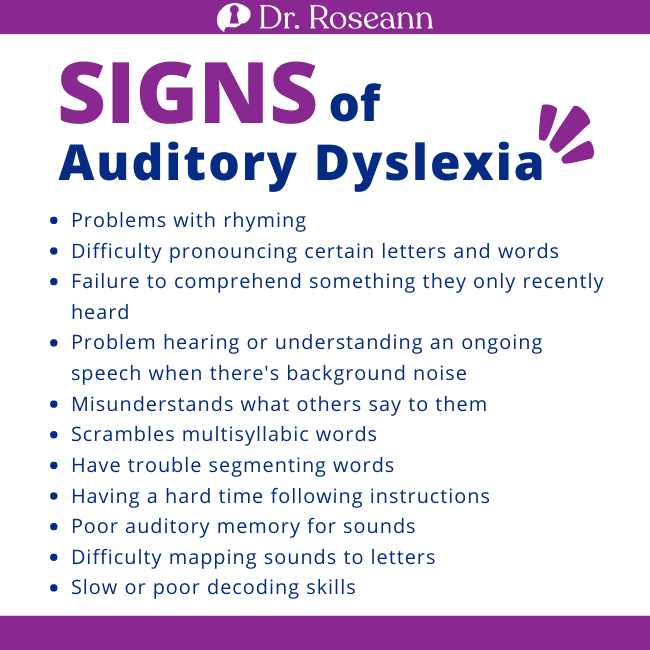
Dyslexia is quite common, and many bright individuals have dyslexia. The common signs of auditory dyslexia observed in children are:
- Problems with rhyming
- Difficulty pronouncing certain letters and words
- Failure to comprehend something they only recently heard
- Problem hearing or understanding an ongoing speech when there's background noise
- Misunderstands what others say to them
- Scrambles multisyllabic words
- Have trouble segmenting words
- Having a hard time following instructions
- Poor auditory memory for sounds
- Difficulty mapping sounds to letters
- Slow or poor decoding skills
Specific Auditory Dyslexia Symptoms
More than the signs, parents must also be aware of the specific symptoms of auditory dyslexia observed in children. The primary areas of concern are as follows.
#1 Auditory memory errors
It may be difficult for auditory dyslexic children to recall the sounds of letters and words spontaneously due to inefficient memory processing. Children with auditory dyslexia tend to substitute certain sounds and names.
#2 Auditory synthesis and analysis problems
An auditory dyslexic individual is a struggling reader because they get bothered by unfamiliar words. It is because they lack structural analysis. Structural analysis and auditory synthesis allow a person to identify morphemes, particularly the root word, prefixes, and suffixes of unfamiliar words. Or, more simply, they cannot decode a word.
#3 Auditory discrimination difficulties
Since certain letters and words sound almost the same, a child with auditory dyslexia will have specific difficulty noting the similarities and differences in these words, word parts (segments), and sounds. The problem only worsens if the child also has issues ignoring background voices and noises (APD) or problems with attention or ADHD.
#4 Auditory sequencing problems
A child with auditory processing difficulties can't retain sound sequences in their short-term memory, which is necessary for them to reproduce the word in the proper order when reading it out loud. For this reason, they tend to revert the order of syllables when reading words.
#5 Sound and symbol association issues
With auditory dyslexia, the child can't associate graphemes with their phonemes. It means that the child with auditory dyslexia has difficulties understanding the 44 phonemes of the English alphabet. They also get confused because different letters may have other phonemic properties. For example, the “y” sounds like “e.”
As a result, they have trouble with consonant combinations and the different sounds produced when combining consonants and vowels. These kids also struggle with letters' soft, hard, and silent sounds, which may also change depending on their position.
#6 Repetitions and Hesitations
Often, children uncertain about the correct pronunciation of a word will pause incorrectly between words. Before attempting to read a problematic word, the child with auditory dyslexia repeats the preceding words or phrases several times. This inefficient process uses up a tremendous amount of memory.
#7 Mispronunciations
Kids with auditory processing problems mispronounce vowels, particularly long and short sounds. There can also be mispronunciations of individual consonants, consonant blends, digraphs, or diphthongs. Mispronunciations may also be due to incorrect stress on syllables in words. Some children make the same mistakes repeatedly, reflecting a specific area of weakness that needs direct remediation.
#8 Sound Omissions and Additions
Children with auditory dyslexia will omit or add single syllables or phonemes when reading or pronouncing words. Doing so may significantly change the meaning of the words or even make the word completely different.
Common Causes of Auditory Dyslexia
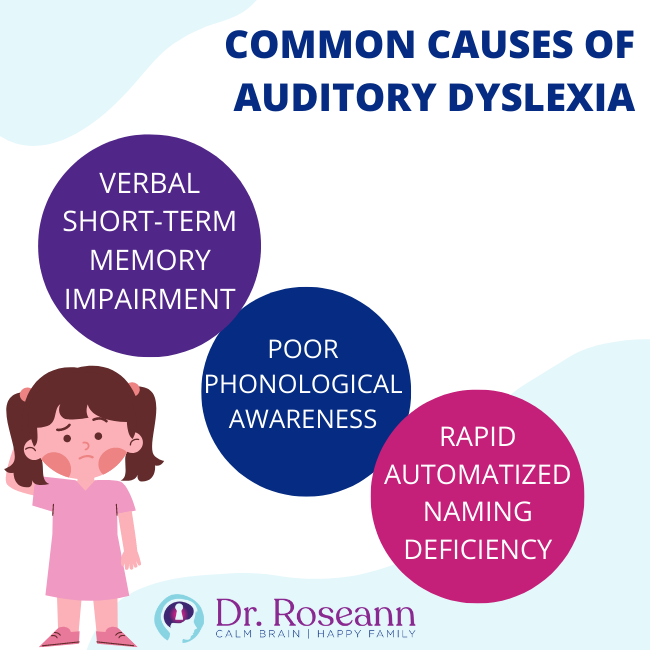
Dyslexia is a disorder that runs in families and looks different depending on the person's pattern of assets and deficits. Having secondary clinical issues such as central auditory processing disorder, Attention Deficitt Hyperactivity Disorder ADHD or anxiety, which are common with dyslexia, can certainly exacerbate the condition.
It is essential to focus on the cognitive skills that affect language-related functions to understand auditory dyslexia. Here are some issues that contribute to dyslexia difficulties.
#1 Verbal short-term memory impairment
Verbal memory is a part of one's short-term memory that allows individuals to recall verbal items or words. Children with dyslexia often lack the memory capacity to process phonemes and syllables.
The memory system of a dyslexic can be impaired in several ways. Holding information or the ability to remember information can get in the way of not just reading but other areas of learning. Furthermore, one study shows that verbal and visuospatial sequence information appears to be impaired by serial order STM (Majerus & Cowan, 2016).
Dyslexics tend to be kinesthetic learners. This helps them with episodic memory, as well as memory related to phonics.
#2 Poor phonological awareness
The concept of phonological awareness refers to a person's ability to recognize a language's phonological or sound structure. This skill involves identifying speech sounds, including rhymes, syllables, and individual phonemes within a word. Poor phonological awareness is the hallmark of dyslexia.
As part of phonological awareness, phonemic awareness involves identifying and manipulating phonemes. Phonemes refer to basic units of sound in words. Therefore, segmenting and blending are two essential phonemic awareness skills.
Segmenting is the process of breaking apart a word into its basic sounds. Blending involves saying new words after each syllable is heard. One study found that the word reading efficiency of children with dyslexia and neurotypical developing children is affected by phonological awareness (Knoop-van Campen et al., 2018).
#3 Rapid automatized naming deficiency
Rapid Automatized Naming (RAN) pertains to the speed a person can retrieve the names of letters, numbers, symbols, colors, or objects from their long-term memory. Unfortunately, children and teens with dyslexia tend to score lower on RAN assessments than neurotypical kids. To be a fluent reader, one must quickly recognize and produce the sounds.
Natural Solutions for Auditory Dyslexia
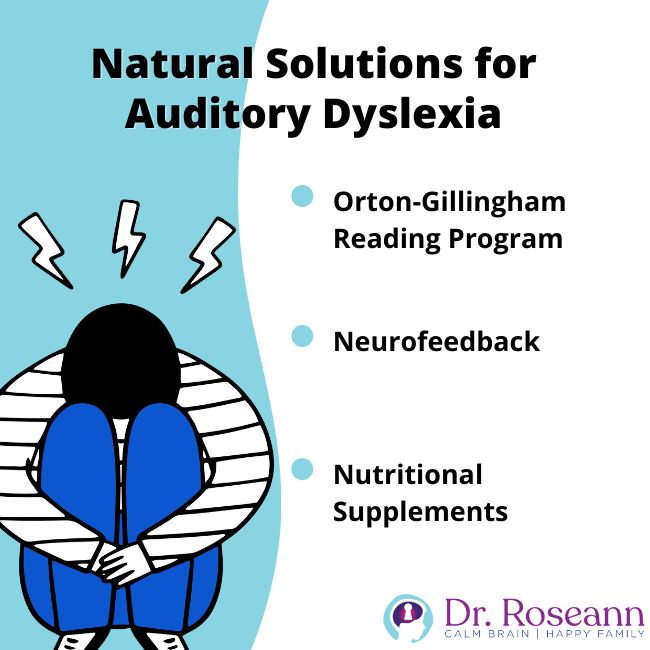
Parents of kids with auditory dyslexia should know there are different ways to improve their children's cognitive and auditory skills. The first step to helping a lot of children with learning disabilities is by addressing their weaknesses through specific dyslexia instruction from a highly trained instructor, which will give the child the necessary foundational skills to build upon.
Orton-Gillingham Reading Program
The Orton-Gillingham approach emphasizes the connection between letters and sounds in a very formal, sequential manner. This program teaches children how to decode words into their phonemes or syllables. Furthermore, they will know how to encode words orally into their phonemes and syllables to spell them correctly.
This approach will develop fluency and automaticity at the word level and alleviate the potential impact of atypical auditory processing. However, the Orton-Gillingham Reading Program is more of a technique than an educational program, which means only well-trained individuals can implement it. Typically instructors are teachers or speech and language pathologists. Other programs based on O-G methodologies, such as the Wilson Reading or Lindamood Bell, are packed programs that make it easier for teachers to implement.
O-G programs are highly prescriptive and sequential, which requires the program to be followed in order and done with intensity by a highly trained teacher. To remediate dyslexia, the child requires four to five weekly O-G-based sessions.
Neurofeedback
One study tested how neurofeedback could enhance speech perception amid noise among children with auditory dyslexia. In four sessions of neurofeedback training, the subjects showed enhanced attentional modulation and cortical responses to target speech over the four-week training period (Kim et al., 2021).
Children with auditory dyslexia may have overactive and underactive brain waves that neurofeedback can help train and correct. Neurofeedback shows poor brain communication in language processing areas, which makes sense given that dyslexia is a language-based disorder.
Sessions of Neurofeedback training reinforce the brain to self-regulate. It improves timing and connectivity for enhanced learning. Neurofeedback improves cognitive functioning and language processing, allowing the brain to perform more efficiently. The training can target specific brain areas that process phonemes, auditory information, language, executive functioning, and attention to help kids with auditory dyslexia.
Strengthening the dyslexic child's cognitive and auditory processing skills through neurofeedback and cognitive behavioral therapy also improves their phonemic awareness, short-term memory, and rapid automatized naming skills.
Jimmy was a “high functioning dyslexic,” meaning that he used his visual memory and intelligence to memorize many words to pretend he could read. As school got harder, it became clear that Jimmy couldn't read.
When his third-grade teacher called his parents and asked, “Do you know Jimmy can't read?” his mother was thrilled because she knew it. With Wilson's reading support, neurofeedback, and supplements, Jimmy could read at grade level within a year. Jimmy later returned to be my intern, and it was a joy to see how successful he became as an adult.
Nutritional Supplements
The brain functioning of children with auditory dyslexia must be supported because it is always in overdrive trying to keep up. Dyslexics have to work so hard to decode and encode language. Using natural brain supplements like magnesium combined with an anti-inflammatory diet, quality sleep, and proper exercise optimizes the brain to address auditory processing issues, among other things.
Most dyslexics have secondary problems with their reading disability. Issues such as anxiety, deficient executive functioning, and poor memory and attention are common and further tax the dyslexic brain. Nutritional supplements may help to support the dyslexic brain and secondary issues as well.
With the right instruction, dyslexics can be normal readers and more importantly thrive. Listen to Kat's story about how she learned to overcome her dyslexia in our program.
Citations
Iliadou, V., Bamiou, D.-E., Kaprinis, S., Kandylis, D., & Kaprinis, G. (2009). Auditory Processing Disorders in children suspected of Learning Disabilities—A need for screening? International Journal of Pediatric Otorhinolaryngology, 73(7), 1029–1034. https://doi.org/10.1016/j.ijporl.2009.04.004
Kim, S., Emory, C., & Choi, I. (2021). Neurofeedback Training of Auditory Selective Attention Enhances Speech-In-Noise Perception. Frontiers in Human Neuroscience, 15(676992). https://doi.org/10.3389/fnhum.2021.676992
Knoop-van Campen, C. A. N., Segers, E., & Verhoeven, L. (2018). How phonological awareness mediates the relation between working memory and word reading efficiency in children with dyslexia. Dyslexia, 24(2), 156–169. https://doi.org/10.1002/dys.1583
Majerus, S., & Cowan, N. (2016). The Nature of Verbal Short-Term Impairment in Dyslexia: The Importance of Serial Order. Frontiers in Psychology, 7(1522). https://doi.org/10.3389/fpsyg.2016.01522Hod
Always remember… “Calm Brain, Happy Family™”
Are you looking for SOLUTIONS for your struggling child or teen?
Dr. Roseann and her team are all about solutions, so you are in the right place!
There are 3 ways to work with Dr. Roseann:
You can get her books for parents and professionals, including: It’s Gonna Be OK™: Proven Ways to Improve Your Child’s Mental Health, Teletherapy Toolkit™ and Brain Under Attack: A Resource For Parents and Caregivers of Children With PANS, PANDAS, and Autoimmune Encephalopathy.
If you are a business or organization that needs proactive guidance to support employee mental health or an organization looking for a brand representative, check out Dr. Roseann’s media page and professional speaking page to see how we can work together.
Dr. Roseann is a Children’s Mental Health Expert and Licensed Therapist who has been featured in/on hundreds of media outlets including The Mel Robbins Show, CBS, NBC, PIX11 NYC, Today, FORBES, CNN, The New York Times, The Washington Post, Business Insider, Women’s Day, Healthline, CNET, Parade Magazine and PARENTS. FORBES called her, “A thought leader in children’s mental health.”
She coined the terms, “Re-entry panic syndrome” and “eco-anxiety” and is a frequent contributor to media on mental health.

Dr. Roseann Capanna-Hodge has three decades of experience in working with children, teens and their families with attention-deficit hyperactivity disorder (ADHD), autism, concussion, dyslexia and learning disability, anxiety, Obsessive Compulsive Disorder (OCD), depression and mood disorder, Lyme Disease, and PANS/PANDAS using science-backed natural mental health solutions such as supplements, magnesium, nutrition, QEEG Brain maps, neurofeedback, PEMF, psychotherapy and other non-medication approaches.
She is the author of three bestselling books, It’s Gonna Be OK!: Proven Ways to Improve Your Child's Mental Health, The Teletherapy Toolkit, and Brain Under Attack. Dr. Roseann is known for offering a message of hope through science-endorsed methods that promote a calm brain.
Her trademarked BrainBehaviorResetⓇ Program and It’s Gonna be OK!Ⓡ Podcast has been a cornerstone for thousands of parents facing mental health, behavioral or neurodevelopmental challenges.
She is the founder and director of The Global Institute of Children’s Mental Health, Neurotastic™Brain Formulas and Dr. Roseann Capanna-Hodge, LLC. Dr. Roseann is a Board Certified Neurofeedback (BCN) Practitioner, a Board Member of the Northeast Region Biofeedback Society (NRBS), Certified Integrative Mental Health Professional (CIMHP) and an Amen Clinic Certified Brain Health Coach. She is also a member of The International Lyme Disease and Associated Disease Society (ILADS), The American Psychological Association (APA), Anxiety and Depression Association of America (ADAA) National Association of School Psychologists (NASP), International OCD Foundation (IOCDF).
© Roseann-Capanna-Hodge, LLC 2023
Disclaimer: This article is not intended to give health advice and it is recommended to consult with a physician before beginning any new wellness regime. *The effectiveness of diagnosis and treatment vary by patient and condition. Dr. Roseann Capanna-Hodge, LLC does not guarantee certain results.

